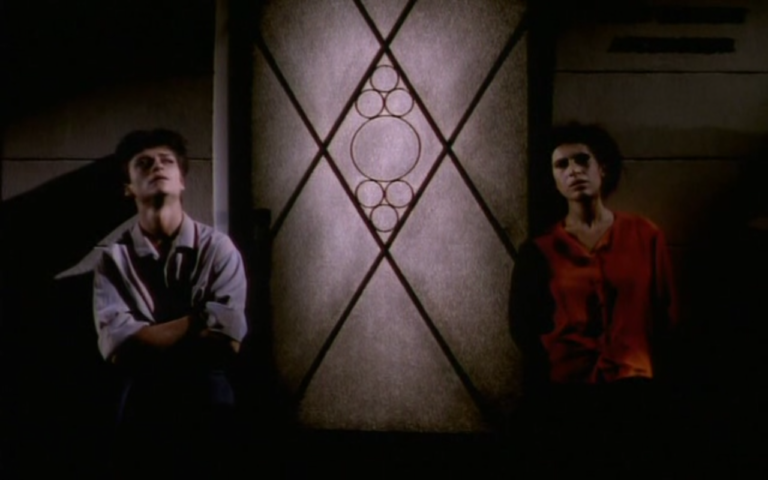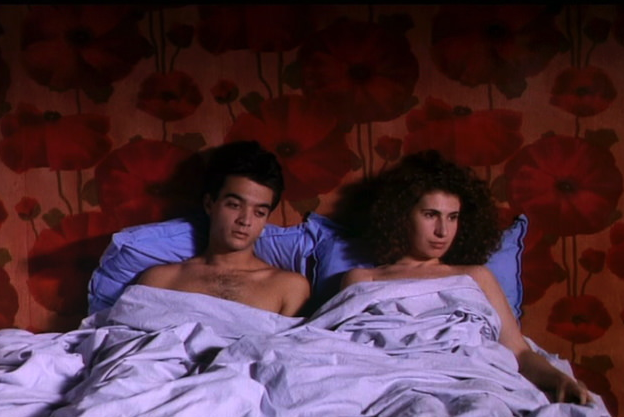The release of Chantal Akerman’s Nuit et jour (English: Night and Day) in 1991 garnered a fairly positive reception at the time from advocates of the French-Belgian filmmaker’s work, including auteurist-friendly French publications like Cahiers du Cinema, J. Hoberman, and Jonathan Rosenbaum (the latter included the film in his Essential 1000 Films list). Yet the film remains, if not a minor Akerman, a lesser-known entity.
As Akerman’s later work in the 1980s and 1990s began to take on a less openly or stridently feminist and experimental direction, some of the criticisms against her work at that time hinted that the director had perhaps lost her edge. In retrospect, an exact quarter century later, Night and Day is a refreshingly casual piece of feminist filmmaking. And yet, the categorizations of it being “feminist” in reviews were unfortunately the sort that resorted to comparisons to other, (male-directed) movies, specifically, the “feminist Jules et Jim!”
Sure, except the film is so much more than its premise, which features a French love triangle. Even the act of describing Julie (Guilaine Londez) as a more fleshed-out character compared to Truffaut’s Catherine (Jeanne Moreau) becomes an unnecessary binary. Akerman’s films are known for exploring the interior, intimate lives of women characters—in fact, she’s a cinematic pioneer in that regard—and the films made by the male French New Wave directors were often known to have complicated depictions of women that frequently connoted an idealistic vision of erotic desire. So why not treat instead Night and Day as a film of its own accord?

I may be biased against binaries, but Akerman certainly is not in Night and Day, if the title didn’t give it away. Julie is blissfully in love with her live-in boyfriend Jack (Thomas Langmann) in the honeymoon period of their relationship. They don’t do much in life—they don’t even own a telephone—because making love to each other in their sparsely furnished apartment is top priority. Material objects, jobs, friends, children, a telephone, those things will come with time—”next year,”x in their words, though the actual timing is deliberately vague. For now, they’d rather make love, and talk about their love.
Julie and Jack’s love is the kind of intense, clothed-only-in-bedsheet passion that must eventually follow one of two directions: fade out or delve into unhealthy The Realm of the Senses territory. It’s the love of children who shrug off adulthood responsibility for another day, another time. Run-ins with Jack’s parents and neighbours underscore both the triviality of adult problems and the lovers’ irreverent jejunity. These people who briefly enter their lives and apartment are exceptionally worried about all sorts of trifles: leaks, splinters from the wood flooring, fires, missing cats. Julie and Jack’s relaxed demeanor, in contrast, somehow comes off as the more sensible outlook; this reaches its peak when Jack’s father’s urges his son to take care of his teeth, which borders on a risible hysteria that all but robs the request of its tangible importance.
As this is an Akerman film, interiors and spaces define the lives, personalities, and headspaces of characters. At home, Julie and Jack can’t get their hands off each other. When he drives his taxi during the night, she walks all night while thinking about him. It’s an interesting separation—the two confess that they don’t stop thinking about each other during the duress of the night, but their activities help them process that separation—his is compulsory, so they can earn a meagre living and still pay rent and eat, and hers less so, but the act of walking outside allows Julie cope with her Jack-less nights by at least being somewhere else outside of their home.

Being surrounded by strangers all night eventually gets Julie into trouble. A coincidental run-in with the day-shift driver of the same cab, Joseph (François Négret) leads Julie literally into the act of moonlighting: Her days are spent with Jack, her nights are spent with Joseph. Her nights, then, become mirrored in place and activity to her days—the man may have a different name (though like Jack he is quite pale, serious, and slightly simple), and the apartment may be a different hotel room each night, but the two don’t do much other than making love or professing love for each other. But here, Night and Day diverges from most stories involving infidelity: Instead of leaving Jack for Joseph, or instead of breaking up with Joseph, Julie decides she loves them both. She claims that it’s possible to do so (despite Joseph’s skepticism). As to who she chooses at the end of the film: That surprise is perhaps better left unspoiled, though to offer a clue, people do call the film “feminist” for a reason.
The lovers’ embraces embody, as some critics have noted, a “painterly” quality—they seem like a still-life portraiture of young people pre-, mid- or post-coitus, but outside of a couple of erotically charged scenes, there is very little sexual activity on display. It’s the words and gestures that do all the talking in Night and Day, to express that wild, uninhibited love of youth. Akerman’s pointed formation of love, then, consisting less of real-time carnal action and more of its idealistic expressions, in the consistent use of kisses, embraces, and forget-me-not words, show us in a very slow, simmering fashion, the ephemeral nature of young love that its well-intentioned practitioners believe to be eternal. Night and Day builds its themes around the consistency of small habits cherished by its characters, and so when the slightest of things change closer to the end of the film, like Julie coming home late from her night out, or the couple deciding to paint their apartment, the narrative implications feel gargantuan. This last-minute whirlwind of plot is not out of nowhere, but perfectly situated for the stuck-in-a-rut mindsets of its characters. Sometimes, all it takes is a small change in our environment, a sudden noise or a new outfit, perhaps a fresh coat of paint on the walls, to jolt us out of our reverie and get us moving again, to get us to value the shortness of time, and the difference between night and day.

